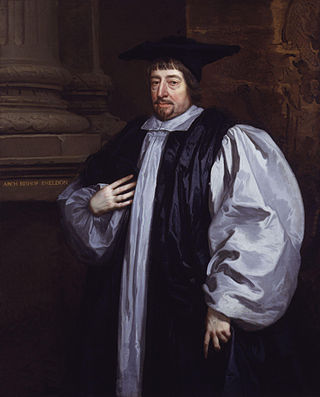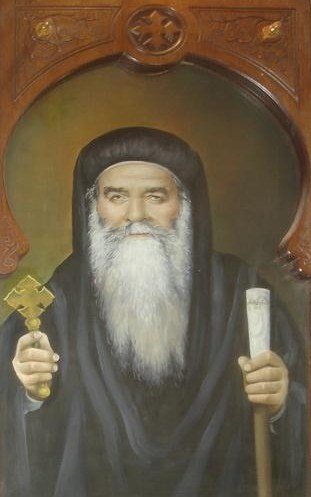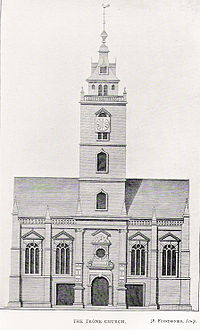
1606 (MDCVI) was a common year starting on Sunday of the Gregorian calendar and a common year starting on Wednesday of the Julian calendar, the 1606th year of the Common Era (CE) and Anno Domini (AD) designations, the 606th year of the 2nd millennium, the 6th year of the 17th century, and the 7th year of the 1600s decade. As of the start of 1606, the Gregorian calendar was 10 days ahead of the Julian calendar, which remained in localized use until 1923.

Charles Emmanuel II ; 20 June 1634 – 12 June 1675) was Duke of Savoy and ruler of the Savoyard states from 4 October 1638 until his death in 1675 and under regency of his mother Christine of France until 1648. He was also Marquis of Saluzzo, Count of Aosta, Geneva, Moriana and Nice, as well as claimant king of Cyprus, Jerusalem and Armenia. At his death in 1675, his second wife Marie Jeanne Baptiste of Savoy-Nemours acted as regent for their nine-year-old son.

Gilbert Sheldon was an English religious leader who served as the Archbishop of Canterbury from 1663 until his death.

Pope Cyril VI of Alexandria also called Abba Kyrillos VI, Coptic: Ⲡⲁⲡⲁ Ⲁⲃⲃⲁ Ⲕⲩⲣⲓⲗⲗⲟⲥ ⲋ̅ ; was the 116th Pope of Alexandria and Patriarch of the See of St. Mark from 10 May 1959 to his death.
The Sovereign Council was a governing body in New France. It served as both Supreme Court for the colony of New France, as well as a policy-making body, though this latter role diminished over time. The council, though officially established in 1663 by King Louis XIV of France, was not created from whole cloth, but rather evolved from earlier governing bodies. As early as 1647, a council of three was created by the King. In 1648, this council was enlarged to include five members. The Sovereign Council came to be known as the Superior Council as early as June 16, 1703, when Louis XIV issued a royal edict referring to it as the Superior Council instead of its former name, and increasing the number of sitting Councilors from seven to twelve.
Acca or ACCA may refer to:
Muggleswick is a village and civil parish in County Durham, England. It is situated a few miles to the west of Consett. the population was 130 at the 2001 Census reducing to 113 at the 2011 Census.
Robert Foster may refer to:
William Fuller (1608–1675) was an English churchman.
Humphrey is both a masculine given name and a surname. An earlier form, not attested since Medieval times, was Hunfrid.
Andrew Cant (c.1626–1685) was a Scottish clergyman and scholar, and Principal of the University of Edinburgh from 1675 to 1685.
Arthur Rose was a Scottish minister, Archbishop of St Andrews, and, informally, the first Episcopal Primate of Scotland, after the fall of the Restoration Episcopate in 1689.

All Saints' Church is the ancient parish church of Fulham, in the County of Middlesex, pre-dating the Reformation. The parish was founded in the precinct of Fulham Manor, currently adjacent to it, which was in the possession of the Bishops of London, since the 8th century. Hence it began as the parish church of the bishops of London and several of them are buried there. It is now an Anglican church in Fulham, London, sited close to the River Thames, beside the northern approach to Putney Bridge. The church tower and interior nave and chancel are Grade II* listed.

Humphrey Henchman (1592–1675) was a Church of England clergyman and bishop of London from 1663 to 1675.
Laurence Womock (1612–1686) was an English bishop. He is best known for his controversial writings, some of which were signed Tilenus, after Daniel Tilenus, expressing his hostility to Calvinism in general, and the Synod of Dort in particular.

William Annand was a Scottish minister of the Church of Scotland who was the Dean of St Giles Cathedral in Edinburgh, Scotland.

Galeazzo Marescotti was an Italian cardinal.
Andrew Cant may refer to:

The Archeparchy of Aleppo of the Maronites is a seat of the Maronite Church. The archeparchy's current ordinary is Archeparch Joseph Tobji.
Thomas Henchman, D.D. (1642–1674) was an Anglican priest and the Archdeacon of Wilts from 1 August 1663 until his death.
This page is based on this
Wikipedia article Text is available under the
CC BY-SA 4.0 license; additional terms may apply.
Images, videos and audio are available under their respective licenses.








